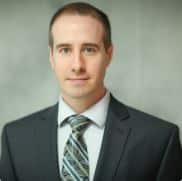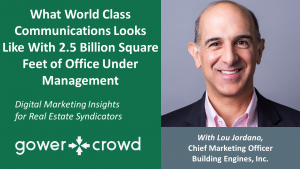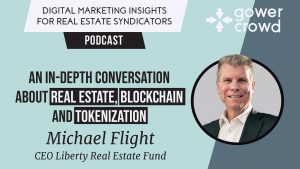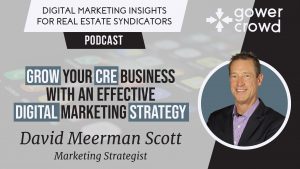FREE TRAINING
What is Real Estate Crowdfunding?
Learn how to build wealth and earn passive income in real estate while someone else does all the work.
225 Jason Fritton, Co-Founder and CEO, Patch of Land


Scratch Pad
This was an extremely painful experience. He lost everything and wanted to do something again because, as he says, “once you start a company that does well that is what you're going to do for the rest of your life. It's in your blood at that point.” Jason had to take a day job in deciding what else he was going to do next. He wanted a company that had thousands of very happy loyal customers and clients. He had known the CEO of a company that was doing crowdsourced graphic design and who was just blowing up the entire industry and doing very well and this gave Jason the idea that this kind of company was the future. He felt that this is how things are going to move because we're so interconnected today that the ability to be able to reach out to people that you didn't have any sort of previous relationship with, and to be able to focus their resources their skills and their experience into what had previously or what would otherwise be very difficult project was very powerful.
Jason sat down with a scratch pad on his couch one day and asked himself ‘how would this type of thing work in a big scalable fun sense?’ Driving his inspiration that day, was that one of the biggest things that was really traumatic to him about losing his company beforehand was that he lost his house and a lot of people really take for granted just how nice it is to have your own place your own piece of the planet your own patch of land – which is where he came up with the name. Real estate resonates with people. Deep down everybody wants to feel like they have some corner of the earth that is theirs.
Leaders of The Crowd
Conversations with Crowdfunding Visionaries and How Real Estate Stole the Show
Discover how laws that gave us crowdfunding were solely meant to finance small companies and yet inadvertently opened the doors to allow you to invest in real estate like never before.
Read the book and listen to the actual conversations.
No Bid
Even though he didn't know anything about real estate at the time, around 2010 which was the depths of the market, he went and took a look at the auctions out in Chicago to see what type of opportunity was there. What he found was that there was always just the same group of 12 guys at this particular point that were bidding on good properties. These were smart guys. Highly experienced guys. Wealthy guys. Always the same small group of people that were on a first name basis. It was a very insular group.
At one of the first auctions he went to there was a property that came up nearby where Jason was living. The current appraisal on it was $300,000 dollars. By today's standards after the recovery it is probably worth $600,000 or more. But back then that appraisal was $300,000 and minimum bid on it was $20,000.
And nobody bid on it.
How to Fund Your Deals
7 Steps to Raising Equity Online
The clique of regular buyers who all knew each other were highly experienced and at all those auctions they were bidding on the big properties and multimillion dollar properties and small properties, that Jason considered to be the bones of real estate, were a little bit beneath their attention at that point. Not only that, but because it was the depths of the housing crisis nobody else had the money because banks weren't lending. Private lenders really had massive liquidity problems and the usual real estate professionals didn't have access to the capital. So this great property went back to the bank or was abandoned and in this Jason saw a real opportunity. He went to his attorneys and to a bunch of mentors that he trusted and told them that this was what he wanted to do.
And without exception they told him that it was a great idea and there's something that they would be really excited about it but that if he did it, he was going to go to prison.They were worried about public solicitation over the internet but Jason, who describes himself as being a stubborn guy always trying to find solutions to complex problems, found out there were a couple of Congress people that were cosponsoring what became the crowdfunding exemptions to what became the 2012 Jobs Act. He worked to advocate for the passage of the idea and once the President indicated his willingness to sign the bill Jason put together Patch of Land full time in an incubator space out in Chicago.
Now the company has gone from that little tiny company built from his couch to one with a run rate of about a third of a billion dollars in annual lending, and climbing rapidly to half a billion by the end of 2018. Jason started from not knowing anything about real estate and now has reviewed billions of dollars worth of opportunities.
How POL Grew
Jason says that the growth of the company is down to one thing, that “begins and ends with a lot of hard work and determination.” When the company first started he was fairly new with the idea of providing access to real estate to people who may have no prior experience whatsoever and the goal was to allow people to invest in real estate from two minutes flat from their phone from their couch from their pajamas if they want to and that was exciting to the wider public. They started doing some press demos and Jason put together a small team in the Chicago incubator space and got a minimally viable product out doing just the absolute minimum of what they would need to be able to get business done in a very minimal sense. They started doing some tech demos and started to get a little bit of press about this. It kind of grew organically at that point. It wasn't something where they just took off and the Wall Street Journal picked up on them. It was very homegrown.
“Every entrepreneur has huge dreams or you wouldn't be an entrepreneur to start with,” says Jason, “And of course along with every huge dream comes every bell and whistles you can think of that's going to great for your customers. A problem is if you go that route right from the very beginning you end up with this development paralysis essentially where you never get the product perfect. It's not exactly what you envision in your head and you delay launching until the opportunity has passed you by.” To overcome this issue he and his team wanted to put together a basic framework online that would allow people to review good real estate opportunities and then place a commitment within them. That was the base of the problem they were solving. They wanted a thousand people to come together and to put a little bit of money into an opportunity to make a big opportunity happen that wouldn't have been possible with these folks individually.
MVP
The minimum viable product that they developed was really just providing the ability for somebody to view a real estate opportunity online, review the due diligence, for POL to upload docs and everything to show why it was a credit worthy, good project and then be able to place a small commitment fractionally and have that tracked. Once they had accomplished that the story became real because for an entrepreneur what you're trying to do may be very clear in your head but one of the biggest challenges to getting something off the ground is communicating that to other people and getting them to believe in it. Consequently, you have to be able to show somebody relatively quickly and to be able to show the wider public relatively quickly what your idea is. What exactly is the value of it. With their MVP, they were able to show that someone was able to come into a deal and put a tiny little bit of money into real estate and be able to own real estate across the country and that they can do it from their phone.
That was enough to get some articles written about them even though they hadn't done any business at that point, it was enough to be able to say “hey, look at these guys over here. They have this kind of cool little idea,” and it blossomed from that because you never know who's looking at those type of articles. And somebody else who was looking at other marketplace lending companies at the time all of a sudden saw this and said “OK I've got real estate experience and this makes complete sense to me” and that person was Carlo Tabibi, Jason’s co-founder. He has a very prominent powerful family out in Beverly Hills and he's done hundreds of millions of dollars worth of real estate on several different continents. Carlo came to Jason told them that if they were willing to relocate to Los Angeles he would put in a few hundred thousand dollars worth of seed capital to get the company started. So they started from this very simple idea, without actually having done any actual business to getting the right person to believe and that took them to the next level.
Concept Validation
At that point, however, Jason could not move his entire Chicago team because they had families and lives in Chicago. So just Jason and Carlo who started up the business in Los Angeles. Jason moved to L.A. and put another team together and did that very slowly because they did basically all of the work themselves to begin with. They worked 16 hour days every single day, seven days a week to try and get the platform ready in anticipation of launch. He arrived in Los Angeles in September of 2013 and launched the Web site with their first little tiny opportunity in October of 2013. They were set to go speak at a trade show so launched their first project and jumped in the car to go out to Las Vegas to do the presentation.
The deal was only for a $100,000 project and they expected it to take 30 days to fund. It funded in hours and that presented its own problem because they didn’t want to have dead space up there where they didn’t have anything new for investors to get involved in and then see them lose interest. So while in Vegas they had to crunch to find a new a new opportunity to launch from there. From there they picked up speed and really operated in kind of a beta sense. When you have a real estate investment company where the founder doesn't have a whole lot of real estate experience they wanted to take things slowly. Working with other people's money, they were cognizant of that and respectful of that, so they operated most of 2014 in a beta stage while they put the system together.
Scale
They wanted to build a platform that was scalable. Essentially a lot of real estate companies are real estate lenders are built around a few men and women that have been in real estate for a very long time and have a big book of business and they operate off of that that book business but they really don't have the ability to grow far beyond that without finding other men and women who have that type of book of business themselves and getting them to come to their company. Jason wanted a system where they could generate the book of business internally with a very strong conversion funnel on externally developed leads and then be able to have a strong group of smart people internally that they would train up into their products and into their system that could convert and close the leads and be able to handle clients respectfully, efficiently, and with a positive experience. They spent 2015 and 2016 building that system.
Capital
Patch of Land was financed through a few hundred thousand dollar seed round provided by Carlo in Beverly Hills. Then the company raises a Series A. They went the traditional venture capital route which Jason found to be exhausting. You have to convince very smart people that not only do you know what you're talking about directly but that what you're building has the ability to grow into something that's 100 times the size of what it is today and to be able to do it in a relatively quick timeframe. He found that at the same time as it was very challenging, it could also be very discouraging because most VCs will take a look at a hundred different companies before they give one Yes. Which means that say all things equal a company may get ninety nine no's before they get one Yes assuming they ever get a yes.
In addition to the VC community, they also went to Wall Street.as well as to family offices and that's eventually what allowed them to get a lead for the A round. They found a very prominent family office that was also involved with other marketplace lenders like Avant and Ondeck and other companies in different asset classes that had experience with it. They promised a good amount of capital to begin with and then Jason went out to his crowd. The nice thing about building a crowdfunding marketplace lending type company is you end up with a great deal of very happy customers, assuming you're doing your job right. They tend to have significant resources of their own and the entire baseline idea still stands whether it's funding real estate or funding a company that a small amount of capital from a whole lot of people adds up very quickly.
They were able to produce the Series A with a very sophisticated lead from a big family office and then fill it out with clients and who were the best investors because they know what you do and they've had an experience working with you and they're happy with who you are. That's a big advantage that POL has even today. If they ever get in a position where they need capital they have thousands of investors in the platform from whom they can potentially raise capital as long as they can show that they have a good plan for making them a positive return on their investment.
Prefunding
The Series A round raised a little over $23 million and was built from a combination of debt and equity. Some was a straight cash infusion and then an additional amount, a larger amount was POL’s first prefunding line. When they create an opportunity with a real estate developer they have to move fast and can fund a deal on a property in 46 states in as little as a couple of days. But to be able to do that they can't and go have it staged up on the Web site and go out to investors and have them wait for their money to come in. That's not really workable. They found that they had to be able to use thei own capital to fund the property to begin with and so depending upon how quickly they scale, if they’re doing $20 or $30 or $40 million dollars a month, they have to have that amount of capital available to fund deals to begin with. Once funded, they can then take it out to investors. Much of the Series A was earmarked for that capacity.
Another part of the A round was used to reinvest in the company. They needed staff, they needed offices, they needed marketing materials, they needed marketing channels, they had trade shows to attend and they needed press releases. Most people don't realize how quickly money goes when you're a new company. It's a huge achievement to eventually get to be cash flow positive.
Deal Flow
Finding the deal flow from developers or generating the investor base presented respective challenges. Sometimes one drove the model, at times it was the other depending on the stage of the company’s growth. Initially they had a decent amount of opportunities to be able to fund but they had no investors. So they had to get new investors on board because you can't promise a real estate professional you're going to fund their deal when they may have earnest money down on it if you don't have the investment backing to make it happen. At the same time how do you get those investors if you don't have deals. So there's a chicken or egg argument early on. They needed capital just like any small company to make these opportunities actually happen and it can be difficult advertising for this type of opportunity. They had a constraint in capital initially both on the warehouse lines for prefunding and as well as just investment capital from investors.
Deal size was also a constraint. They can't do a $10 million deal if it's going to take two years to be able to fund while sitting on a Web site. And then once they started getting a lot more attention they started to grow organically on the investment side. They were producing around an 11 percent return backed by solid hard asset that was worth more than the investment to start with. So that was a very appealing product. And once their investors started to see a good return on their investments and be able to get their money flowing in every single month they would tell other folks and it would grow very organically from that.
Eventually you get to the point where that balance started to tilt towards having too much money and not enough product and then we had to take internal capital and market back out and find out how to reach out to what can be a very insular group of real estate professionals to be able to get the opportunity to work with them and then it goes back and forth depending on what stage of the company you're in. Today they have billions of dollars worth of capital commitments and can fund pretty much as much as they can get in as far as solid opportunities are concerned as long as there are good opportunities. They get a lot of applications from folk who have big dreams but really don't have a good plan for how to make their project happen and, naturally, they can't fund those. As of the date of recording the podcast, they were constrained on the deal flow side as opposed to the capital side.
Deal Types
Currently, POL only works on construction opportunities with real estate professionals on non-owner occupied properties. A lot of what they do can be called a fix and flip or a fix and rent or a refinance to rent. They deal with folk who know what they're doing in real estate. POL goes back to their investors and are able to say this person has a reasonable expectation of being able to pull off this project primarily on single family residential and small multifamily although they are now branching into small balance commercial as well in the $1 to $5 million dollar segment. They are also doing new construction in specific markets and they are going to be expanding aggressively as they continue to develop skills and making sure to adequately underwrite additional markets for that type of product. They also want to move into long term investments.
To date they have been constrained on doing long term because they have been working with the crowd and the crowd doesn't want their money tied up for five years or seven years or 30 years but that's 85 percent of the market. So it's absolutely a priority for POL to get into that market. As they have grown they’ve developed credibility have been able to engage and interest billion dollar Wall Street firms. Those firms take a look at the loan tape and their underwriting criteria and the viability of the company itself and they've been able to do a forward flow for this type of product. For the longer term product they are currently negotiating and expect to have something in place by year end 2018.
The new products will be along the lines of a 5/1 ARM for a rental portfolio and not owner occupied. They don't want to move into owner occupied opportunities at this point simply because of the regulatory environment is extremely burdensome. When they started this they started because there was a massive fragmentation. There was a failing in this type of industry where the banks wouldn't lend on these types of opportunities but there is a huge market and hundreds of billions or even trillions depending upon how far out in the asset class you go. But the banks didn't do a good job with it. So there's a huge opportunity. The banks do generally a pretty decent job with residential mortgages but Jason believes that POL is in a much bigger market that is so huge that even if he is able to scrape together a tiny bit of market share he figures they will be doing very well.
RELATED PODCASTS
353 Lou Jordano, Chief Marketing Officer of Building Engines, Inc.
Last Updated on September 15, 2021 by Dr. Adam Gower NEW BOOK BY ADAM GOWER PH.D. A BRAND NEW WAY TO FINANCE REAL ESTATE …No matter how many investors you…
READ MORE >399 Michael Flight, CEO of LibertyFund.io
Last Updated on September 15, 2021 by Dr. Adam Gower Michael Flight, CEO of LibertyFund.io An In-Depth Conversation about Real Estate, Blockchain and Tokenization NEW BOOK BY ADAM GOWER PH.D.…
READ MORE >400 David Meerman Scott, Marketing Strategist
Last Updated on September 15, 2021 by Dr. Adam Gower David Meerman Scott, Marketing Strategist Grow your CRE business with an effective digital marketing strategy NEW BOOK BY ADAM GOWER…
READ MORE >












